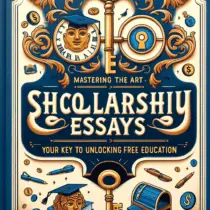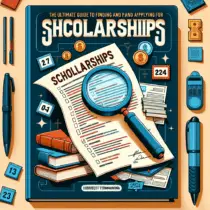Everyone dreams of pursuing higher education without the burden of financial stress. Scholarships are a golden ticket for many students to achieve this dream. However, winning a scholarship is not as simple as filling out an application form. It requires crafting compelling essays that capture the reviewers’ attention and set you apart from other candidates. Mastering the art of scholarship essays can unlock opportunities for free education and open doors to a brighter future.
Understanding the Importance of Scholarship Essays
Scholarship essays are vital components of most scholarship applications. They provide a platform for students to showcase their achievements, aspirations, and unique qualities that make them deserving candidates. Essays help scholarship committees understand applicants beyond their grades and test scores.
A well-written essay can highlight personal experiences, challenges overcome, and future goals. It offers insight into an applicant’s character and commitment to their field of study or community service. Therefore, investing time and effort into creating a standout essay is crucial for scholarship success.
Research Thoroughly Before Writing
Before beginning any essay, it’s essential to research thoroughly about the scholarship organization and its mission. Understanding what the organization values will help tailor your essay to align with their expectations.
Start by exploring the organization’s website, reading about previous winners’ experiences, and noting any specific themes or questions mentioned in the scholarship prompt. This knowledge will guide your writing process and ensure that your essay resonates with the reviewers.
Create an Outline
An outline acts as a roadmap for your essay. It helps organize thoughts coherently and ensures that all key points are addressed systematically.
- Introduction: Capture attention immediately—perhaps with a compelling anecdote or a thought-provoking quote related to your journey or aspirations.
- Body: Include several paragraphs covering different aspects such as academic achievements, extracurricular activities, personal experiences, and future goals. Ensure that each paragraph flows logically into the next.
- Conclusion: End with a strong closing statement summarizing why you are an ideal candidate for the scholarship.
Be Authentic and Personal
Scholarship committees receive thousands of applications; standing out requires authenticity. Share genuine stories about yourself—your passion, challenges faced, lessons learned, and how these experiences have shaped your aspirations. Avoid clichés or generic statements; instead, focus on specific incidents that illustrate your unique journey. Authenticity creates an emotional connection, making a lasting impression on readers.
Showcase Achievements Modestly
While it’s important to highlight accomplishments within the essay, remember to balance confidence with humility. Avoid coming across as arrogant or boastful. Instead, demonstrate how your achievements are relevant to your desired field of study and underline your dedication, hard work, and perseverance.
Use concrete examples to quantify your impact where possible, e.g., “Initiated a recycling program that increased campus-wide participation by 25%” rather than vague claims like “contributed significantly to environmental efforts.”
Focus on Clarity and Simplicity
Clarity and simplicity are paramount for effective communication. Complicated jargon and flowery language can distract and undermine your message. Use straightforward language and concise sentences to convey your ideas effectively. Ensure grammar and punctuation are flawless by meticulously proofreading to produce a polished final draft.
Given the word limits imposed by many scholarships, prioritize quality over quantity. Make your point succinctly rather than rambling aimlessly. Remember, less is often more.
Avoid Common Pitfalls
Certain common mistakes can decrease your chances of winning scholarships:
- Plagiarism: Always create original content. Plagiarism is not only unethical but easily detected using software tools, leading to disqualification.
- Ignoring Instructions: Follow guidelines carefully, including word count, font size, and formatting requirements. Deviating from instructions can jeopardize your application.
- Neglecting to Tailor Your Essay: Generic essays used for multiple applications rarely succeed. Tailor each application to specifically address the prompt and criteria of the scholarship.
- Submitting Late or Rushed Work: Start early to allow ample time for brainstorming, drafting, and revising. Submitting rushed, last-minute work reflects poorly on your commitment and seriousness.
Edit and Revise Thoroughly
Editing and revising are critical steps in the writing process. Once you complete your initial draft, take a break and return with a fresh perspective to identify areas for improvement. Read aloud to catch awkward phrasing and clunky sentences. Solicit feedback from trusted mentors, teachers, or peers and incorporate constructive criticism to strengthen the overall quality of your content and presentation.
Make multiple passes, focusing on different aspects each time, e.g., one pass for grammar, another for clarity and coherence, and a third for ensuring alignment with the prompt. Remember, patience and diligence are key to refining an exceptional essay.
Seek Professional Help If Needed
If you’re struggling, seek professional guidance. Many resources are available, including school counselors, online forums, and workshops dedicated to helping students prepare successful applications. Consider investing in assistance from professional writers or editors who specialize in crafting compelling narratives. Within budget constraints, this can be a valuable investment that increases your odds of securing coveted scholarships.
Conclusion
Mastering the art of writing effective scholarship essays opens doors to countless educational opportunities and can potentially transform lives. While it is undoubtedly a challenging endeavor requiring dedication and effort, the rewards are immense. By understanding the importance of research, preparation, authenticity, and clarity, and by avoiding common pitfalls and thoroughly editing and revising your work, you can significantly improve your chances of success. Embrace the process wholeheartedly, discovering untapped potential for personal growth along the way. Ultimately, the key to unlocking free education lies within your determination and commitment to navigating this journey of excellence in narrative expression.
Good luck to all aspiring scholarship applicants! Your dedication and hard work can pave the way to a brighter, more promising future.






